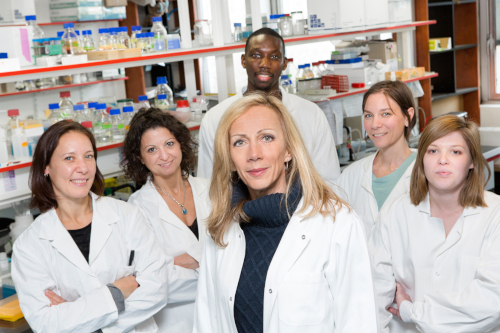
Among the different therapeutic approaches developed for Duchenne muscular dystrophy, several exon skipping techniques are being studied, in particular the antisense oligonucleotides and AAV-U7 gene therapy. The France Piétri-Rouxel team (Sorbonne University – INSERM/Institute of Myology) has just published, in the Molecular Therapy review, results demonstrating the benefit of combining these to optimise the exon skipping strategy. Because, when used individually, in mice modelling Duchenne muscular dystrophy, these techniques show certain limitations, such as a rapid decline in their effects.
The France Piétri-Rouxel team had the idea of combining these in order to increase efficacy. To test this hypothesis, it used mice modelling severe Duchenne muscular dystrophy, who would not survive more than a few weeks without treatment. After the birth of these mice, the researchers performed three injections of next-generation antisense oligonucleotides (PPMO – peptide-linked morpholino antisense oligonucleotides), followed three weeks later by the injection of an AAV-U7 gene therapy, which allows the exon skipping molecule to be made in the muscle in order to act.
The results, published in Molecular Therapy – Methods & Clinical Development, show that this treatment is proving to be particularly effective. The researchers observed:
- an increase in survival in the treated mice, unsurpassed to this day (52 weeks instead of 7 without treatment);
- an improvement in skeletal muscle strength;
- a long-term preservation of the diaphragm and the heart;
- muscle protection from fibrosis and inflammation.
While the treatment must still be optimised to prolong its effects, the team of researchers is continuing the study of this innovative combination with a view to commencing a clinical trial.
